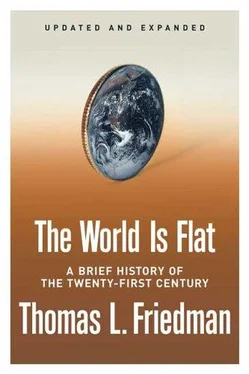What makes Yamanism and bin Ladenism so unfortunate as strategies for Arab influence in the world is that they ignore the examples within Arab culture and civilization-when it was at its height-of discipline, hard work, knowledge, achievement, scientific inquiry, and pluralism. As Nayan Chanda, the editor of YaleGlobal Online, pointed out to me, it was the Arab-Muslim world that gave birth to algebra and algorithms, terms both derived from Arabic words. In other words, noted Chanda, “The entire modern information revolution, which is built to a large degree on algorithms, can trace its roots all the way back to Arab-Muslim civilization and the great learning centers of Baghdad and Alexandria,” which first introduced these concepts, then transferred them to Europe through Muslim Spain. The Arab-Muslim peoples have an incredibly rich cultural tradition and civilization, with long periods of success and innovation to draw on for inspiration and example for their young people. They have all the resources necessary for modernization in their own cultural terms, if they want to summon them.
Unfortunately, there is huge resistance to such modernization from the authoritarian and religiously obscurantist forces within the Arab-Muslim world. That is why this part of the world will be liberated, and feel truly empowered, only if it goes through its own war of ideas—and the moderates there win. We had a civil war in America some 150 years ago over ideas-the ideas of tolerance, pluralism, human dignity, and equality. The best thing outsiders can do for the Arab-Muslim world today is try to collaborate with its progressive forces in every way possible— from trying to solve the Arab-Israeli conflict, to stabilizing Iraq, to signing free-trade agreements with as many Arab countries as possible-so as to foster a similar war of ideas within their civilization. There is no other way. Otherwise this part of the world has the potential to be a huge un-flattening force. We have to wish the good people there well. But the battle will be one for them to fight and to win. No one can do it for them.
No one has expressed what is needed better than Abdel Rahman al-Rashed, the general manager of the London-based al-Arabiya news channel. One of the best-known and most respected Arab journalists working today, he wrote the following, in Al-Sharq Al-Awsat (September 6, 2004), after a series of violent incidents involving Muslim extremist groups from Chechnya to Saudi Arabia to Iraq: “Self-cure starts with self-realization and confession. We should then run after our terrorist sons, in the full knowledge that they are the sour grapes of a deformed culture... The mosque used to be a haven, and the voice of religion used to be that of peace and reconciliation. Religious sermons were warm behests for a moral order and an ethical life. Then came the neo-Muslims. An innocent and benevolent religion, whose verses prohibit the felling of trees in the absence of urgent necessity, that calls murder the most heinous of crimes, that says explicitly that if you kill one person you have killed humanity as a whole, has been turned into a global message of hate and a universal war cry... We cannot clear our names unless we own up to the shameful fact that terrorism has become an Islamic enterprise; an almost exclusive monopoly, implemented by Muslim men and women. We cannot redeem our extremist youth, who commit all these heinous crimes, without confronting the Sheikhs who thought it ennobling to reinvent themselves as revolutionary ideologues, sending other people's sons and daughters to certain death, while sending their own children to European and American schools and colleges.”
Too Many Toyotas
The problems of the too sick, the too disempowered, and the too humiliated are all in their own ways keeping the world from becoming entirely flat. They may do so even more in the future, if they are not properly addressed. But another barrier to the flattening of the world is emerging, one that is not a human constraint but a natural resource constraint. If millions of people from India, China, Latin America, and the former Soviet Empire who were living largely outside the flat world all start to walk onto the flat world playing field at once-and all come with their own dream of owning a car, a house, a refrigerator, a microwave, and a toaster-we are going to experience either a serious energy shortage or, worse, wars over energy that would have a profoundly unflattening effect on the world.
As I mentioned earlier, I visited Beijing in the summer of 2004 with my wife and teenage daughter, Natalie. Before we left, I said to Natalie, “You're really going to like this city. They have these big bicycle lanes on all the main roads. Maybe when we get there we can rent bikes and just ride around Beijing. I did that last time I was there, and it was a lot of fun.”
Silly Tom. I hadn't been to Beijing in three years, and just in that brief period of time the explosive growth there had wiped out many of those charming bicycle lanes. They had been either shrunken or eliminated to add another lane for automobiles and buses. The only biking I did there was on the stationary exercise bike in our hotel, which was a good antidote for having to spend so much time sitting in cars stuck in Beijing traffic jams. I was in Beijing to attend an international business conference, and while there I discovered why all the bikes had disappeared. According to one speaker at the conference, some thirty thousand new cars were being added to the roads in Beijing every month-one thousand new cars a day! I found that statistic so unbelievable that I asked Michael Zhao, a young researcher in the Times's Beijing bureau, to double-check it, and he wrote me back the following e-mail:
Hi Tom, Hope this email finds you well. On your question about how many cars are added each day in Beijing, I did some research on the Internet and found that... car sales in [Beijing] for April 2004 were 43,000—24.1% more than same period last year. So that is 1,433 cars added [daily] to Beijing, but including secondhand car sales. New car sales this month were 30,000, or 1,000 cars each day added to the city. The total car sales from Jan. to April 2004 were 165,000, that is about 1,375 cars added each day to Beijing over this period. This data is from the Beijing Municipal Bureau of Commerce. The city's bureau of statistics has it that the total car sales in 2003 were 407,649, or 1,117 cars each day added. The new car sales last year were 292,858, or 802 new cars each day... The total number of cars in Beijing is 2.1 million... But the recent months seem to have witnessed surging sales. Also noteworthy is last year's SARS outbreak, during which period a lot of families bought cars, due to panic about public contact and a sort of doomsday-stimulated enjoy-life mentality. And many new car owners did enjoy their time driving, as the traffic in the city so much improved with a lot of people voluntarily caged at home, without daring to go out. Since then, coupled with dropping car prices due to China's commitment to reduce tariffs after joining the WTO, a large number of families have advanced their timetable of buying a car, although some others decided to wait for further drops of prices. All the best, Michael.
As Michael's note indicated, you can see China's middle class rising right before your eyes, and it is going to have enormous energy and environmental spillover. The Great Chinese Dream, like the Great Indian Dream, the Great Russian Dream, and the Great American Dream, is built around a high-energy, high-electricity, high-bent-metal lifestyle. To put it another way, the thirty thousand new cars a month in Beijing, and the cloud of haze that envelops the city on so many days, and the fact that the city's official Web site actually keeps track of “blue sky” days all testify to the environmental destruction that could arise from the triple convergence-if clean alternative renewable energies are not developed soon. Already, according to the World Bank, sixteen of the twenty most polluted cities in the world are in China, and that pollution and environmental degradation together cost China $170 billion a year (The Economist, August 21, 2004).
Читать дальше












